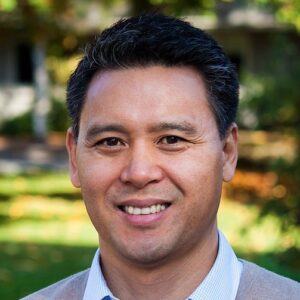
The Best Thing Anyone Ever Told Me in Graduate School
The best thing anyone ever told me in graduate school rings as clear and true today as it did then. It was during the first year of my doctoral work after one of my classes that my instructor pulled me aside and said matter-of-factly, “Mark, you’ve got a chip on your shoulder, and you need to do something about it.”
We had finished one of her class sessions when I followed her out of the classroom and wanted to ask some follow-up questions from our discussion. I could tell she was frustrated with me from the tone of her voice and the directness of the message. I paused. My lips began to quiver and my eyes started to well with tears, and yet I will be forever grateful for the truthfulness of those words, for their bite, and their ability to catalyze a sorely-needed recalibration in my life.
Up to that point, I was a student who had learned to verbalize my thoughts aloud by asking questions and offering many comments. I was curious and it helped me work through my questions. It also made me look and feel smart, or so I believed. Looking back on those days, my academic insecurities resulted in a lot of unnecessary verbal processing and quite frankly, some badgering.
The formation of an academic scholar cuts both ways. On the one hand, I learned in different graduate schools to look at reality and theory from multiple angles. Interpretations and understandings are usually more complex than any single reasoning and a thorough search of these multiplicities is not only scholarly, but integrous. It takes careful tending for an academic to hone their craft well in areas of curiosity, observation, research, and reasoning. And this refining results in one of the best parts of academic formation, which is to see and name complexity.
On the other hand, untended graduate academic formation has the potential to harm. The very skills that afford us the capacity to rigorously research a matter can ironically produce in us a rigidity that locks us into our arguments and reasoning. We may cease to consider an alternative explanation, or worse, adopt inflexible forms of argumentation and reasoning for the sake of being clearly the only right one. Having clarity and conviction while holding complexity isn’t an issue; neither is the practice of logic and debate. Rather, an underlying and often unnoticed dynamic of needing to be right, or to be the smartest one, or the recognizable one, is what is troubling about this kind of formation in an academic.
This is why tending to our formation while in graduate school and beyond is so important for those in the academy. In graduate school we are introduced to, and then eventually hold on our own, many powerful tools and capacities that can help to heal, transform, and harm. What my instructor did for me that day was to awaken me to things I could not see about myself and how I held myself in graduate school and our learning community. My hunch is that she knew she could do this because she was not only my advisor, but also a mentor. My hunch is that in some way, she knew she had to take this step for other community colleagues and for my future. Her truthfulness cut right through any theory or concept and hit home because it came out of a good, and frustrated, place where I could receive this difficult word well and sit with it for days. In some ways, I should not have been surprised by this encounter because my academic trajectory had reached a point where being the one who asked (unnecessary) questions and offered tiresome rebuttals was sadly powerful. I needed this demonstration of love and care though I did not know I needed it until it actually happened.
My personality is such that I will always have an edgy, passionate, and direct side to who I am as both a professional and an academic. However, because someone in graduate school took the time to tell me something I really needed to hear, I find that I can hold these parts of who I am more reasonably now. I am working on not always having to respond to statements I do not agree with and finding other ways to contribute to the process than with unnecessary words, and I am (and I think others around me are) the better for it.
So, what is the best thing anyone ever told you in graduate school?
Leave a Reply